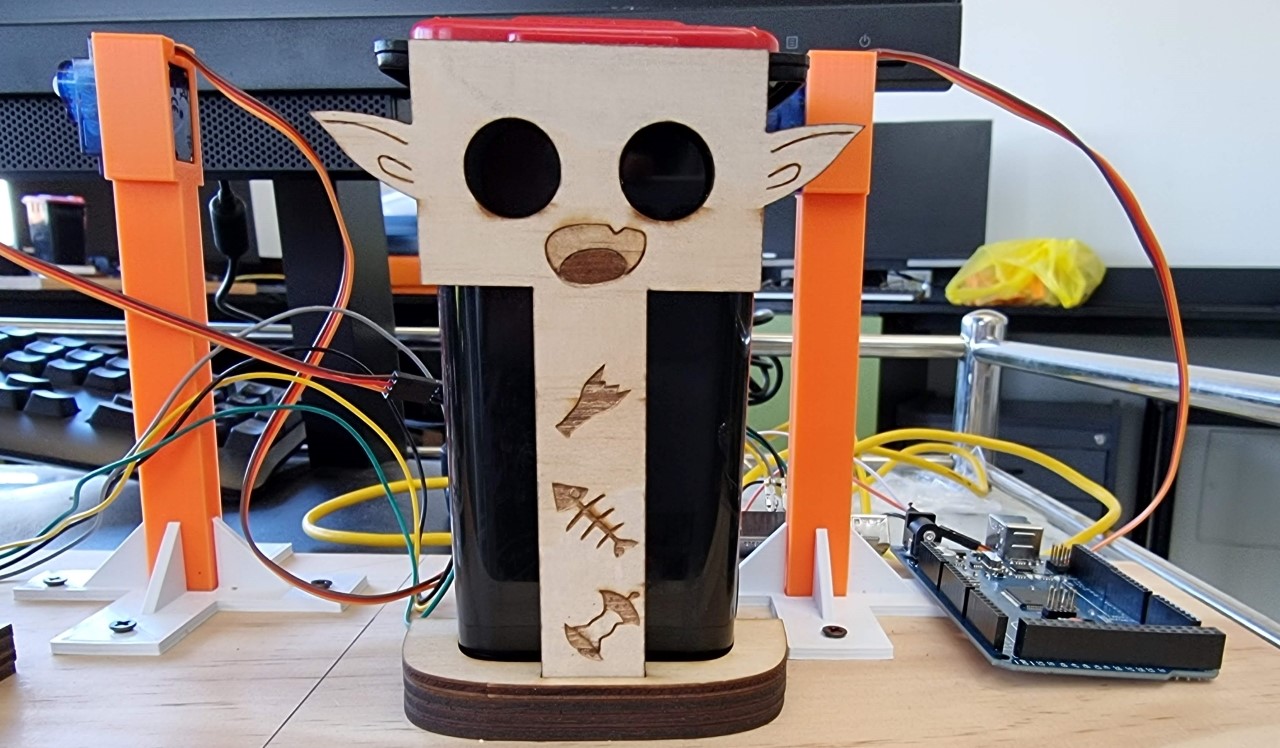School kids develop smart bins for better waste management

The TECHSprint bins are able to get a ‘makeover’ with a laser cut design.
In summary
- KIOSC’s Maker Project: TrashBot Challenge is helping students to improve waste management practices in schools with innovative smart bins
- The program enables Year 9 and 10 students to use artificial intelligence and machine learning to create a prototype that can be implemented to promote sustainability
- Swinburne and the Knox Consortium of Secondary Schools developed KIOSC to educate and inspire students to prepare for the careers of the future, with a strong focus on STEM
Swinburne is supporting school students to create sustainable waste management practices using smart bins with KIOSC’s Maker Project: TrashBot Challenge.
The Maker Project: TrashBot Challenge is a design thinking program for Year 9 and 10 students to identify and tackle waste management issues in their schools.
KIOSC (Knox Innovation Opportunity and Sustainability Centre) provides a smart rubbish bin prototype, which can be customised. Students design and build the bin using artificial intelligence and machine learning. For example, they can have the bin categorise rubbish or use sensors to notify maintenance teams when the bins need to be collected.
Preparing for careers of the future
The Maker Project: TrashBot Challenge inspires students to use ‘problem solving, creative thinking and technology’ to find a solution to a global issue, says KIOSC Systems Coordinator Brendan Kroon. ‘Students learn vital skills such as programming and wiring circuit boards, that not only can be used in this project, but also in their future careers,’ he says.
KIOSC began in 2012 and is a partnership between Department of Education, Swinburne and the Knox Consortium of Secondary Schools, funded by the Victorian Government. It aims develop an innovative facility that inspires students to prepare for the careers of the future, with a strong focus on STEM. The Maker Project: TrashBot Challenge received grant funding from the Australian Government.
Project Lead at KIOSC, Leanne Caira, says there is no textbook for what they do.
‘It is truly unlike any school and there is always a new project. We are so fortunate to have the ability to have such innovative technology, most of which does not even exist in schools.’

Engaging online
With ongoing COVID-19 lockdowns, KIOSC ran the Maker Project: TrashBot Challenge as an online program.
The team 3D-printed 184 kits to distribute to students, teachers and staff. They shared detailed lesson plans to provide additional support to teachers and livestreamed lessons.
‘Effective communication was key to success and students were very adept at being prepared,’ Caira says.
Eighty-five per cent of participating teachers indicated that they would continue to deliver similar multidisciplinary projects in the future to engage students.
‘The students have been engaged with this work and they enjoyed the hands-on kit that they were given and the challenge to get their bin to open. I had one of my disengaged students participate and take an interest for the first time and get his bin to work,’ one says.
Caira says that sparking interest in students is incredibly rewarding after spending time researching, developing and implementing new and innovative technologies.
‘We have a talented team, and everyone works to better what they have done. Our clients are incredibly special to us and inspiring learners is the best job ever.’
-
Media Enquiries
Related articles
-

- Technology
- Science
- Engineering
Victorian students drive green energy transition through international hydrogen competition
Swinburne’s KIOSC, in collaboration with Horizon Educational and Gippsland Tech School, co-hosted the Hydrogen Grand Prix in Melbourne.Friday 26 July 2024 -

- Technology
- Health
New MedTechVic prototypes to transform everyday lives of people with a disability
Swinburne’s MedTechVic has revealed three new prototypes designed through the joint Health-led Manufacturing Innovation Program, in partnership with the Australian Medtech Manufacturing Centre and Safer Care Victoria
Friday 19 July 2024 -

- Science
Skin, scales and fish tails: using collagen to turn fish guts into gold
New research from Swinburne could transform the sector by converting high value collagen proteins from seafood by-products into cosmetics, food, and pharmaceuticals.
Tuesday 02 July 2024 -

- Science
- Engineering
Submarines in the future could self-identify cracks and self-heal thanks to Swinburne researcher
Thanks to the work of Dr Nisa Salim from Swinburne University of Technology’s School of Engineering, future submarines could self-identify microcracks and self-heal using a new kind of carbon fibre reinforced polymer composites.
Monday 17 June 2024 -

- Business
- Technology
Swinburne’s Luminate Pitch Night 2024 advances innovative ideas for a better world
Swinburne’s 2024 Luminate Pitch Night showcased market-ready ideas from 10 founders
Wednesday 12 June 2024

